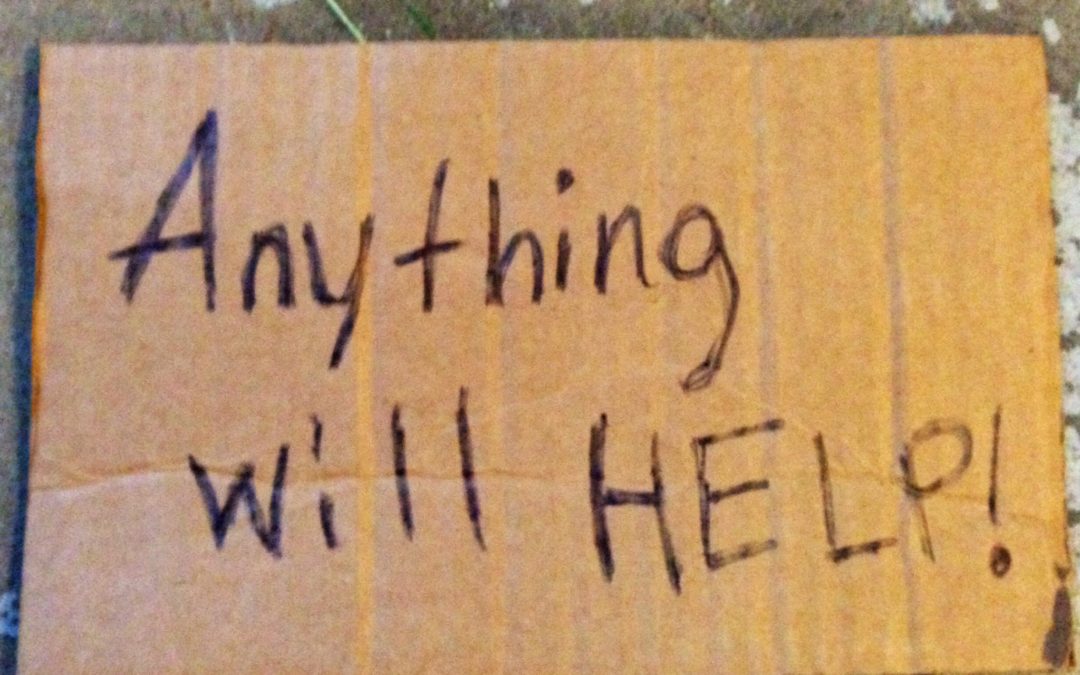by Monica Palmer
“Anything will help.”
That was the message scrawled on a cardboard sign held up by a man just outside of my driver’s side window the other day. I had to make a decision before the light turned green. Should I avoid eye-contact and sit there uncomfortably until the light changed, or should I just go ahead and give the guy some change?
I rarely have real, foldable money with me. However, that particular day I actually had a couple of dollars in my purse. I remember thinking I would use it to splurge on a coffee, but somehow that seemed insignificant when I looked…really looked at this man standing out in the cold holding his sign. I don’t know what circumstances brought him to this place, and I don’t know why he needed the money. I just felt that three dollars didn’t mean nearly as much to me as it would to him.
I quickly grabbed the cash and held it out my lowered window. He jumped immediately into action to retrieve the offering, and then he gave his thanks in a way I’ve never experienced.
His eyes lit up at my tiny gesture. He smiled and motioned for me to hold on as if I had control over the light and when it would change. Then, he leapt into a flurry of disjointed dance moves that reminded me of my two year-old watching The Wiggles. There was so much joy in his movements that it dumbfounded me. I gave him three dollars, and he was dancing like I had given him three thousand! He continued dancing and pointing to me as if to say, “this is for you.”
I know some people would consider my actions foolish or naïve, because the man probably didn’t use that money for anything “good.” It’s true that I will never know what he did with that money, but I do know what the act of giving it did for me. I got more from that three dollars’ worth of happy dancing than I could’ve gotten from a week’s worth of coffee. I’m still getting a buzz from that moment, and I catch myself smiling at the memory of it.
An article published by the Association for Psychological Science talks about the health benefits of compassion. The article mentioned a study that measured disease-causing cellular inflammation in people who considered themselves to be “very happy.” The assumption was people who are happy would have lower inflammation. This turned out to be true, but only for a certain variety of happy people.
Apparently, there are a couple of different kinds of happiness. There’s the kind you get from attaining that shiny new big screen TV, or designer bag, or some other coveted item. Then, there’s the kind you feel when you volunteer at a food bank or give three dollars to a person in need on the street. The happy people who achieved their happiness through focusing on themselves had higher levels of inflammation than the people who found their joy from serving others.
Today, many of my friends and family woke up early in the hopes of snagging some “Black Friday” deals. Some of them even began this practice before their Thanksgiving leftovers were put away yesterday. I’m curious about their happiness level right now. I wonder if they found the joy they were searching for, or if they simply found more stress.
You may have resources which seem insignificant to you that could be incredibly meaningful to others. Maybe you have a few extra bucks, a little extra time, or a little extra food in your pantry. You can turn those small things into something bigger by donating and volunteering. You’ll be a blessing to others, and you’ll be blessed in return. It truly is better to give than to receive, and anything will help.

